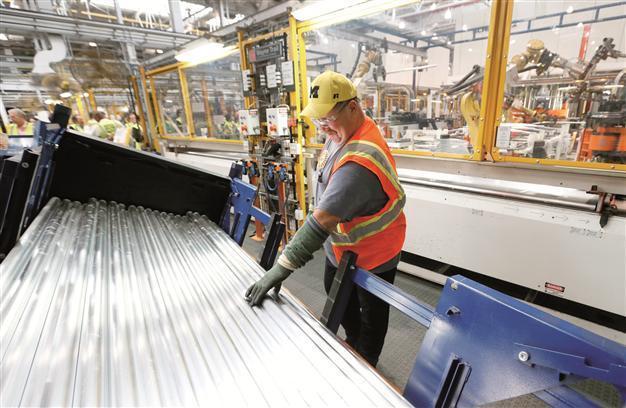Turkish manufacturing sector slows down in January
ISTANBUL – Doğan News Agency

A key factor behind the deteriorating business climate in January was a renewed fall in the volume of new orders, following a four-month
sequence of modest expansion, while new export business contributed to the decline,
according to the index. AP Photo
The manufacturing sector stagnated in Turkey in January as outputs, new orders, exports and purchases of inputs all declined despite a dramatic increase in employment, says the latest PMI data.
Turkey’s manufacturing sector slowed down to start 2015, according to HSBC’s Turkey Manufacturing Purchasing Manager Index (PMI), which was released by Markit on Feb. 2.
“Output, new orders, exports and purchases of inputs all declined in January, although employment continued to rise sharply. The latest survey results also indicated weakening inflationary pressure,” said the statement.
The PMI fell for the second month running to 49.8 in January, from 51.4 in December 2014 after five months of growth, according to the PMI data. The headline HSBC Turkey Manufacturing PMI is a composite single-figure indicator of manufacturing performance. Any figure greater than 50.0 indicates an overall improvement in the sector.
“Manufacturing conditions showed stagnation in January. New orders and new export orders fell, but input price pressures continued to moderate and job creation remained strong. Firms stated that lower export orders were related to instability in the Middle East and Ukraine,” said Melis Metiner, chief economist at HSBC Turkey.
“Official data published by the statistical office [TÜİK] shows that Turkey’s exports to the Middle East fell by 1 percent in annual terms in the January-November 2014 period, while exports to Russia were down by 14 percent and exports to Ukraine were down by 20 percent. Exports to the European Union, on the other hand, increased by 9 percent. For 2015, the subdued growth outlook in the eurozone and a weaker euro pose downside risks for Turkish export performance. Domestic demand growth, on the other hand, could accelerate in the early part of the year, on the back of monetary easing,” said the report.
A key factor behind the deteriorating business climate in January was a renewed fall in the volume of new orders, following a four-month sequence of modest expansion, while new export business contributed to the overall decline, falling at the strongest rate since July 2013. Output declined for the first time in six months, although the rate of contraction had been only modest and output had been partially supported by the completion of existing contracts. Employment had remained a bright spot in January, with the rate of job creation broadly matching December 2014’s three-year high while manufacturers had added to workforces continuously since mid-2009.
Turkish manufacturers reported a fall in the volume of new inputs ordered in January, ending a five-month sequence of modest purchasing growth. This resulted in the fastest drop in pre-production inventories since October 2009.
Meanwhile, activity in China’s factory sector shrank for the second straight month in January, as the new year began with difficulty for the world’s second-largest economy.
The final HSBC/Markit PMI for January came in at 49.7 on a seasonally adjusted basis, just below the 50.0 level that separates growth from contraction. The number was slightly lower than a preliminary “flash” reading of 49.8 but higher than the final 49.6 in December 2014.
